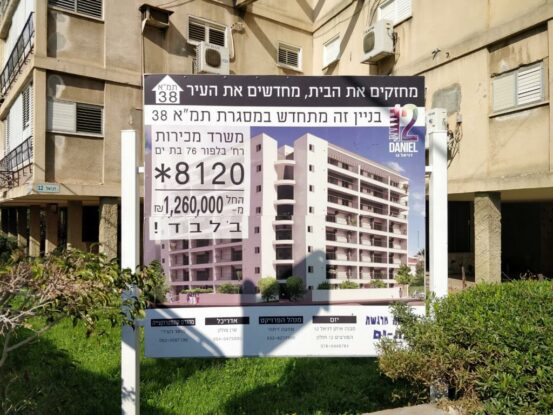A recent court ruling clarified the legal boundaries of TAMA 38 refusal. A tenant refused to sign an agreement for a redevelopment project under TAMA 38/2, arguing it wasn’t actually for seismic strengthening. The court upheld the Supervisor of Land Registration’s authority to force her to sign, ruling that her objections lacked legal merit.
Edited by Adv. Yarin Hason Tzafania
One common way to strengthen old residential buildings in Israel against earthquakes is through the a national urban renewal plan called TAMA 38/2. Often referred to as pinui-binui, this plan involves the demolition and reconstruction of old residential buildings that don’t meet current safety codes. It also grants additional building rights, providing a financial incentive for developers to undertake such projects.
This legal case examines a situation where a tenant refused to sign the agreement for a planned pinui-binui project for her apartment, claiming that it was not intended to strengthen the old building against earthquakes, as the Supervisor of Land Registration claimed.
In this article, we review the legal tension between the authority of the the Supervisor of Land Registration and the property rights of the tenant: what are the legal boundaries of TAMA 38 refusal by a tenant?
Case Background:
The case centers on an appeal of a decision by the Supervisor of Land Registration, who had sided with several apartment owners in a building on Vitkin Street in Tel Aviv. The owners wanted to move forward with a TAMA 38/2 project to tear down and rebuild the aging structure, arguing it no longer met current safety standards. One resident objected and refused to sign the agreement. She argued that the project wasn’t actually about earthquake protection and claimed it didn’t meet the requirements set out in the 2008 Earthquake Protection in Shared Buildings Law.
Discussion & Ruling
The District Court rejected the appeal, basing its decision on four key issues:
The Authority of the Registrar
The court rejected the tenant’s argument that this wasn’t a true TAMA 38/2 project but rather a combination deal involving different zoning rights. She claimed that most of the building rights came from other planning schemes, not TAMA 38/2—but didn’t provide enough evidence to back it up. The court clarified that simply adding residential units doesn’t disqualify a project from falling under TAMA 38/2. As a result, it confirmed that the Supervisor of Land Registration had full authority to handle the case.
The Specific Developer
The court also dismissed the tenant’s objections to the development company selected for the project, including her claim that it lacked experience. It found that the company had met all the necessary requirements to move forward, including offering personal guarantees to the apartment owners. The court also noted that the tenant had tried to derail the project for personal reasons—specifically, by attempting to have her partner appointed as the developer instead.
Equitable Compensation
The court rejected the tenant’s claim that the project’s benefits weren’t being fairly distributed. She didn’t submit any professional appraisal to support her argument and even turned down the Supervisor’s offer to bring in a neutral appraiser. That refusal weakened her case even further.
Decision-Making Process
The court found that the tenant and her partner were well aware of the efforts to move the project forward and had been invited to several meetings—but chose not to participate. They had also taken active steps to delay progress. So, their claim that they were left out of the decision-making process didn’t hold up.
As a result, the court saw no reason to overturn the Supervisor’s decision, rejecting the tentant’s TAMA 38 refusal and upholding the order requiring her to sign the agreement.
Case: Civil Appeal (Tel Aviv) 26306-06-24 Ayala Breyer Saar v. Masada Pasmanik-Shor
Gindi Caspi & Co. is one of Israel’s most prominent law firms in real estate, planning and zoning, and urban renewal. With decades of extensive experience handling complex and large-scale real estate transactions, the firm is consistently ranked among the top-tier firms in these fields by all major rating companies. Notably, the international LEGAL 500 recognized Gindi Caspi & Co. as a Leader in real estate, planning, and zoning and highlighted Adv. Ziv Caspi as a Leading Individual in Israeli law. The firm has also received numerous accolades, including ranking among the top real estate law firms (Dun’stars) in planning, zoning, and urban renewal. It was honored as a “pillar and cornerstone in fulfilling the nation’s vision for building and settling the land.” For five consecutive years, the firm has been ranked first in Israel in the field of urban renewal.
For inquiries, contact law@gindi-caspi.co.il.







